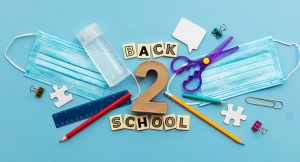Back to school during Covid-19
Almost everyone involved in returning back to school will be feeling nervous and anxious while COVID-19 is still floating around. From teachers, pupils, non-teaching school staff to parents; everyone will have concerns about returning back to the classroom.
We’ve put together some helpful tips to help you get ready.
Government updates
Stay up to date with the latest government guidelines and information which is continually evolving as we continue through the pandemic https://www.gov.uk/government/organisations/department-for-education. Save the link as a bookmark or shortcut on your phone or computer. Seeing it will prompt you to keep checking the website without having to search and find the correct website each time.
Communicate with the school regularly
Most schools will brief their staff prior to going back, however, if you have not heard anything before you start work make sure you have spoken with your school to understand what their policies and procedures are around the coronavirus is. This is particularly important for supply staff who are new to the school and not familiar with the school’s surroundings.
Be PPE ready
Understand the personal protective equipment (PPE) you may be required to wear and have some ready with you at all times. This includes, face masks, face shields, hand sanitisers and gloves. The government is continually implementing immediate changes, therefore its best to stay one step ahead and not get caught out. Some schools are implementing their own policies on PPE so its best you are aware of these and ready to go.
Regularly wash and sanitise hands
From the start keeping hands clean has been the key to preventing and slowing the spread of the coronavirus. Always keep a bottle of alcohol-based hand sanitiser with you and regularly use it. It’s worth investing in a personal bottle of hand gel with a keyring clip so that it can be kept handy at all times and refilled when needed.
Minimise direct contact with your environment
It’s difficult to avoid touching your surroundings but if you can try to avoid making direct contact when opening doors, operating light switches, using computers, laptops and projectors. You can purchase a hygiene hook keyring which is a hook shaped keyring that allows you to open doors and press buttons without the need for direct hand contact.
Listen and be supportive to pupils
Pupils will be feeling a range of emotions as they return back to school, so it’s important you listen and be patient with them.
Ask them what they did while schools were closed, find out how they are feeling and recognise any difficulties they have had through activities and groups sessions.
Letting them know that it’s okay to feel how they are and to talk things through will help ease their emotions and settle back into school life. Never avoid the situation as it will do more damage in the long-term.
Take time out for yourself
Remember you are of no use if you feel burnt out and struggling to keep yourself healthy. It’s important you take time out for yourself to maintain a healthy life and recharge. You may need to take more breaks during the day as it can be overwhelming having to deal with new procedures, being a support arm and taking on work which is new to you.
Be responsive to parents’ concerns
Naturally anxiety levels will be high for parents and they’ll want reassurance that schools are safe and precautions are being taken. You may feel yourself repeating the same information several times to different parents, but remember this will be all new to them just as it is for you.
Give them the time they need and perhaps set up a weekly email update to keep parents up-to-date and keep them reassured. This will also help reduce the number of requests from parents.
Related articles
Taking care of your mental health during lockdown
Teachers to benefit the most from inflation-busting pay rise
£1bn catch-up programme for England schools
5 back to school ideas for teachers
It is that time of year again when, as a teacher, you are readying yourself for another exciting year of study. It can be an exceptionally busy time, which is why it is important you get as much planning done ahead of the first bell of the new term. Once that rings, it is very much go, go, go.
This guide will help you get organised, easing you back into the professional mindset after what is always a welcome break. It is time to get focused, so that you begin as you mean to go on – inspired, full of ideas and enthused about teaching.
Establish a thorough schedule
Make the most of the “free time’ you have before your pupils return/start school. Ideally, you should look to put together the most comprehensive schedule possible.
Use your school’s academic calendar as a framework and plan in lessons, events, days of interest and so forth. Anything that will complement your efforts in the classroom warrants being included. The more prepared you are, the easier life will be.
Re-familiarise yourself with your subject
Needless to say you are somewhat of an authority on your subject matter, but even the most enthusiastic teacher will cut down on research while on their summer holidays.
Start small. See what the Department for Education has published, for example, browse through your tweets and treat yourself to the latest books. Then, of course, as you get closer to the start of term, absolutely blitz the curriculum until you are confident you grasp the overall picture.
Create the right kind of environment
If you are lucky enough to have your own classroom, you should look to create an inviting, purposeful and productive environment to be in. It has to have a certain wow factor to it, the kind that pupils can thrive in.
Think about the mood you are trying to create, the equipment/resources you need on hand, the information you want youngsters to see everyday. So, for example, if you’re a history teacher, populate your classroom with artefacts, posters and even furniture that is relevant to what you will be teaching.
Energisers, icebreakers and group contracts
It is all about first impressions, especially if you’ve got an entire new set of students to teach. Begin then with a number of fun energisers and icebreakers, so that you and your pupils can get to know one another.
You should also turn your attention to what is expected of your pupils when it comes to behaviour. The most effective way of getting youngsters to “sign up” to a “group contract” is to give them ownership of it. Steering them in the right direction, so to speak, get them to come up with their own rules. Stick it up in a prominent place.
Establish 'working socials'
Once the new term starts, you’ll find that every hour of your day will be used up. Be it planning, marking assignments, contending with paperwork, observing presentations and taking charge of extracurricular responsibilities, teaching can be a solitary affair.
This can mean you hardly ever get to engage with colleagues, which is why it is important to establish regular socials. This should be twofold – one type should be free of work, while the other should be a “working social”, where, over beers and food, you discuss, share and learn from one another.








